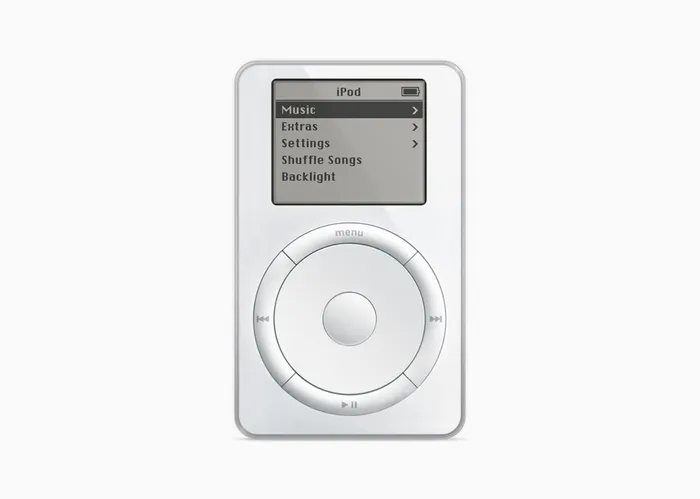
“This coming Tuesday, Apple invites you to the unveiling of a breakthrough digital device (hint: it’s not a Mac)” those were the words written on an official invitation to the Apple iPod launch event on the 23rd of October, 2001. 22 years later on Tuesday 10 May 2022 Apple announced the end of production for the Apple iPod. The device had proven to be a real breakthrough digital device not just for (1) Apple but for the (2) music and the (3) technology world.
APPLE
For the 25 years since Steve Jobs and Steve Wozniak had founded Apple, the personal computer had been the centrepiece of the digital revolution. Now experts were predicting that its central role was ending. One veteran tech journalist wrote that “it matured into something boring”. It was during this period that Apple launched a product that became the iPod. Jobs told reporters that “if anybody was ever wondering why Apple is on the earth, I would hold up this as a good example”. It was the first MP3 player to pack a mind-blowing 1,000 songs and a 10-hour battery into a stunning 6.5-ounce package. The iPod became the essence of everything Apple was destined to be according to Walter Issacson: poetry connected to engineering, arts, and creativity intersecting with technology, and design that’s bold and simple. The iPod turned Apple from a nearly bankrupt company to an eventual $3 trillion behemoth. After 22 years since this product was designed and manufactured its chief architect, Tony Fadell, speaking at the Computer History Museum said this about it “Apple iPod is the only reason why Apple is the company it is today”. The device inspired the creation of the iPhone. It also saved the music industry from piracy.
MUSIC
Before the iPod, the music industry was plagued by a bestiary of piracy services - Napster, Grokster, Gnutella, Kazaa - that enabled people to get songs for free. Partly as a result, legal sales of CDs were down 9% in 2002. It was a tough time for music executives which led to them meeting with Steve Jobs and the rest is history. The iTunes store sold one million songs in the first six days after it was introduced in April 2003, the store went on to sell seventy million songs in its first year. The iPod was instrumental in enabling Apple to sell music and thereby make money for the music industry. This device helped turn Silicon Valley into the epicenter of global capitalism.
TECH INDUSTRY
The iPod’s most important contribution was its role as a catalyst for the creation of the iPhone. The iPhone continued to draw on the blend of software and services that made the iPod succeed. The success of iTunes, which allowed customers to back up their iPhones and put music on the device, was mirrored by the development of the App Store, which allowed people to download and pay for software and services. It started with music through the iPod and all of that was applied to other products. To understand this you have to take into account the fact that in the early 2000s the desktop industry was declining and everything changed with the introduction of products that started with the letter “i” the iPod, iPhone, and the iPad. Everything that came with those products, their capability, and industries they created can be attributed to the iPod. Today we have tech companies that are each worth billions of dollars and all of that was made possible by the iPhone which became possible because the iPod was created.
As the iPod bows out, the technology industry has to take lessons from the creation of this revolutionary product. One of those lessons is that it is not enough to just create a product the product has to make a difference. It’s safe to say that the iPod made a difference in the music industry, the tech world, and our society. Since then no tech product has come closer to resembling what Apple created. Who else will create a product so powerful it creates the first trillion-dollar company, it transforms not one industry but multiple industries. The end of the iPod marks the end of an era. What will come next? My reading of the industry tells me that it’s the robot that is currently under development. For now, we have to learn from the iPod to create the next revolutionary product.
Wesley Diphoko is the Editor-In-Chief of the Fast Company (South Africa) magazine.
Related Topics:
